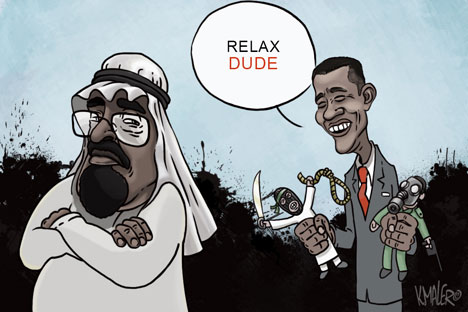
Click to enlarge the image. Drawing by Konstantin Maler
America’s Middle East policy underwent a number of changes in September and October. This is all because of the United States’ refusal to military interference in Syria and a somewhat mitigation of policy with respect to Iran. Such changes caused a negative reaction on the part of Saudi Arabia and Turkey - the most important U.S. allies.
Saudi Arabia positioned itself as a Muslim Sunni world leader. Since 2011, following the "Arab Summer" commencement, the country was rendering support to Sunni Islamic movements that had come to power in a number of countries. Riyadh was in active support of armed Sunni opposition groups right from the start of the Syrian conflict.
In regards to its position with mostly Shiite Iran, Saudi Arabia, as well as other Persian Gulf monarchies united in the Cooperation Council for Arab States of the Gulf, have seen Iran as a threat since 1979 Islamic Revolution.
Turkey holds a position to a large extent similar to the Saudi one with respect to the Syrian conflict and creation of a block of Sunni states. At the same time, a part of the Turkish political establishment worshiping the "neo-Ottoman" ideology has not forgotten that Syria was a member of Ottoman Empire for 400 years.
In its policy toward Iran, Turkey competes with them for the regional leadership, and weakening Iran, Syria's ally, would thus meet global interests of Turkey.
The factor of Sunni-Shiite confrontation deepening after the Syrian conflict started plays not the least role in the policy of Saudi Arabia and Turkey with regard to Iran.
These countries’ position with respect to Syria and Iran significantly corresponded with U.S. strategy, and that of their NATO allies and Israel.
A previously planned U.S. military strike on Syria should have smashed the Syrian army, caused Assad's downfall and swept the Sunni opposition into power. This outcome was counted on by its representatives and supporters - Saudi Arabia and Turkey. Furthermore, Saudi Arabia and some CCASG member countries were even ready to pay U.S.’s costs of striking Syria.
The U.S.’s refusal of military interference in Syria defeated such plans. At the same time, some mitigation occurred in the US position regarding Iran after Hasan Rouhani was elected a new Iranian President and his statements of preparedness to cooperate with the West on the Iranian nuclear programme.
Trends in US Syria and Iran policy changes gave rise to the disappointment and annoyance of Saudi Arabia, as well as Turkey, management first of all. Saudi Arabia refusal from the proposal to be a non-permanent member to the UN Security Council was a manifest demarche.
Some mass media also cited statements made by Bandar ben Sultan, Chief of Saudi Arabia General Intelligence to the effect that the country might reconsider downwards their cooperation with U.S. in the area of purchasing armaments, supply of energy carriers, as well as agree their Syrian policy with US to a lesser extent.
As regards Turkey, a number of experts consider their planned procurement of up-to-date, long-range air defense systems from China as a similar demarche on their part.
It is too early to mention radical changes, however. Such cooling down in allied relations was observed previously. Saudi Arabia applied a "petroleum weapon" during the 1973 Arabian-Israeli war in which they significantly decreased the supply of energy carriers to Western countries. Turkey, during their turn, decreased their NATO cooperation in the period of aggravation in Greek-Turkish relations owing to the Cyprus problem.
At the same time, both countries are connected with the U.S. and West in the political and military respect, and are still dependent on them to a large extent. The U.S. is the security guarantor for Saudi Arabia and CCASG member countries. A U.S. fleet base is located in Bahrain. Many business, political, financial, and economic elite representatives, including members of CCASG ruling dynasties, have business ties with U.S. and the West.
It's hard to assume on that basis that Saudi Arabia would pursue a completely independent policy in the region, therefore, directed against U.S. interests. In regards to Turkey’s convergence with China, it is possible, but it is likely to be limited by the economic aspect. There are virtually no common strategic purposes for a close convergence between Turkey and China, and their foreign policy priorities are too different.
Therefore, the change in the American policy regarding Iran and Syria, and related conflicts with Riyadh and Ankara, still purport no entire change in the U.S. policy and strategic objectives in the Middle East.
Boris Dolgov is a senior researcher with Russian Academy of Science’s Institute of Oriental Studies
First published in Russian in Gazeta.ru.
All rights reserved by Rossiyskaya Gazeta.
Subscribe
to our newsletter!
Get the week's best stories straight to your inbox